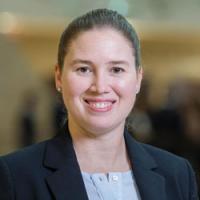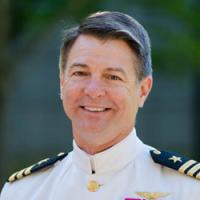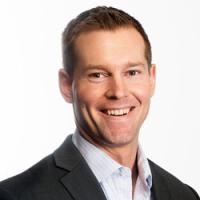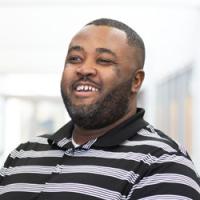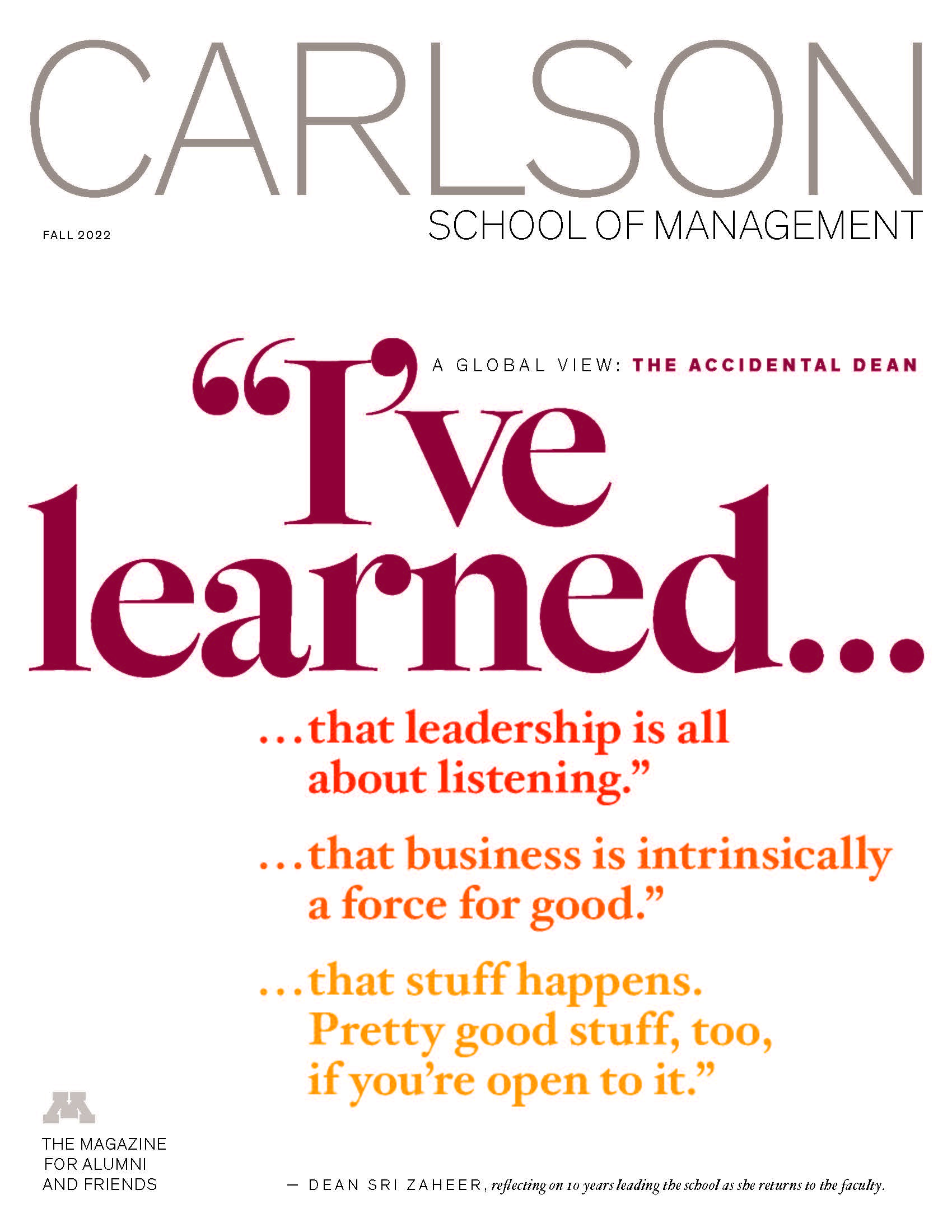
How the Carlson School Serves Military Veterans
Friday, October 14, 2022
BY GENE REBECK
The Carlson School is the #1 Military-Friendly™ graduate business school in the United States.
Why? It talks the talk.
It was 2017, and Amanda Reinert was searching for a new direction. A graduate of the U.S. Naval Academy who served as an active-duty officer from 2008 through 2013, she had been attending graduate school with the goal of a career in oceanography. But she wasn’t sure that was the path she wanted to take.
Then Reinert, a Florida resident at the time, attended a service career conference in Savannah, Ga. There she met Charles “Chip” Altman, a retired U.S. Navy commander and lead recruiter of the Carlson School of Management’s MBA Military and Veterans Program. “He’s very good at what he does,” Reinert says of Altman, who had brought along another military vet who was then pursuing his MBA at the Carlson School, and “they were very adamant that with my background and what I wanted to do, an MBA would be the best option for me, both short- and long-term.”
Reinert hadn’t been considering work or schooling in Minnesota. “I was looking all over the place at the time,” she recalls. But Altman was convincing enough to inspire her to visit the Carlson School. Longish story short: Reinert graduated with an MBA in 2020, and quickly found a position at Arden Hills, Minn.–based agriculture cooperative Land O’Lakes, where she’s now a project manager for supply chain and logistics.
Reinert’s presence in Minnesota is no fluke. She’s one of the more than 175 vets who’ve participated in the Carlson School’s Full-Time MBA program since 2012, when the school established what then was called the Military Veterans Initiative. Over the past decade, the Carlson School has become home to the country’s top-rated, full-time MBA program for military veterans, with vets making up to 15 to 20 percent of the class in any given year.
The Carlson School’s MBA Military and Veterans Program, one of outgoing Dean Sri Zaheer’s most favored initiatives, has achieved this recognition because the school speaks a language that isn’t widely known: the language of military service, and how business can benefit from those who served.
“The [career center] taught me how to translate my military experience into civilian-speak, and how to do an interview and explain how my prior experiences were useful.”
Understanding the Language
Bill Walter, ’72 MBA, and Bill Van Dyke, ’76 MBA, knew that language very well. Both served in Vietnam.
“He was the only person I could ever talk to about Vietnam, and I was the only person he could ever talk to,” Walter recalls of his longtime friend. Walter served in the Seabees, working with the Marine Corps to build air strips and bases. Meanwhile, Van Dyke was a lieutenant in the Army’s artillery division. After his time in Vietnam, Walter recalls that it was difficult to come back “and try to figure out what life is all about.”
Reconnecting with Van Dyke, whom he knew at the U of M before they both went overseas, was a big help. So was the University’s MBA program. “The Carlson School changed my life,” Walter says. “I’d tell anybody that. It was a big part of both of our lives.”
Both men went on to have successful business careers. From 1996 to 2004, Van Dyke served as CEO of Donaldson Co. Under his leadership, sales at the Bloomington, Minn.-headquartered manufacturer of industrial filters doubled to around $1.4 billion. Walter, meanwhile, followed an entrepreneurial path, launching Heartland Realty Investors, a Minneapolis–based multifamily real estate business that now operates in 12 states.
Following the wars in Iraq and Afghanistan, Walter often found himself in conversation with military personnel who were serving or had served in the Middle East. “It brought back such memories of what Bill and I had to endure,” Walter recalls. This would plant the seed for creating a support fund to help veterans transition from the service and attend the Carlson School’s MBA program.
“We wanted to help as many people as we could—military veterans who were coming back and having to adjust to the real world,” Walter says. He, Van Dyke, and school leaders ended up raising slightly more than $10 million to support the initiative.
“From day one when we got the program launched,” Walter explains, “professors would come up to us and say, ‘These military folks, they come and sit in the front row, and they’re so important for the whole class because they’re leaders.’ They know the value of their coursework, and they impart that sense of purpose to the non-vets in their class.”
About seven years ago, Van Dyke became sick with what would turn out to be terminal cancer. Near the end, Walter visited him on his deathbed at his northern Minnesota cabin. “He told me, ‘You know, that military initiative—we did a good thing there,’” Walter recalls. Van Dyke passed a couple of days later.
One of the key reasons why the program “the Bills” helped to launch continues to flourish is Chip Altman, who advocates for the Carlson School across the country. “The military presence in Minnesota is not large,” Altman notes. When the initiative began, one of the big challenges Altman says he and his colleagues faced was how to find and contact individuals in the military who don’t live in Minnesota or know about the Carlson School.
Altman has been spreading the word by visiting education offices on military installations and conferences like the one Reinert attended in Georgia. “I’m able to discuss with [servicepeople] that if you’re able to gain admission to the Carlson School, there is a strong likelihood that you’ll receive some financial assistance,” he says. “Then I can tell them, ‘Look, we’re this top-tier, Big Ten university that has a reach not only across the nation but across the globe. And we will help you by immersing you in the military network that we have established there.’”
Altman and his Carlson School comrades also instill in vet MBA students an awareness of their value to employers. “They often don’t think what they have done in the military equates to anything in the outside world,” he says. That simply isn’t true: “What military people have is boatloads of leadership, far more than their civilian contemporaries at 28 to 32 years old. They’ve led battalions, divisions, and departments—in some cases, of hundreds of people—in very stressful situations.”
Altman adds that “what we can do for them is take the skills they bring and translate them into the language of business.”
“What military people have is boatloads of leadership, far more than their civilian contemporaries at 28 to 32 years old. They’ve led battalions, divisions, and departments—in some cases, of hundreds of people—in very stressful situations.”
Found in Translation
To help both vets and businesses understand each other, the Carlson School Business Career Center has created a “Military 101” document designed to help employers see the value in hiring those who’ve served. Among the other information the document contains is a kind of “dictionary” that translates military terminology (including ranks) that employers might see on a vet’s resume and translate that into business expertise.
A crucial message veterans receive when coming to the Carlson School is that “your experience is really built for a variety of MBA functions,” says Maggie Tomas, executive director, Business Career Center & Graduate Coaching. During orientation, the school provides a career exploration conference with 12 panels of experts and alumni working in fields including B2B marketing, supply chain, and corporate finance. A variety of online resources with information on various business fields is also provided.
“We introduce these to them in a way that’s really broad at first,” Tomas says. As career coaches meet with vets one-on-one during their time as students, they help them narrow down their options. “This is the standard way we work with anyone, veteran or not,” Tomas says. There’s also a series of career workshops that take place throughout the year. “We’re trying to give them as much information as possible,” Tomas adds, noting that over the years, the program has cultivated “a wide variety of employers, both locally and nationally, that are really excited about our vets.”
The program has succeeded because “we consciously thought it through, every step,” says Philip Miller, Carlson School’s assistant dean for MBA and MS programs. In addition to “an explicit and intentional recruitment and outreach to that group,” Miller notes that the school provides needed financial help. Every Full-Time MBA student receives some funding. The average student has received about 60 to 65 percent through the GI bill. For those whose GI Bill funding covers 100 percent, the Carlson School contributes money that goes towards a stipend.
Other Carlson School MBA programs also are attracting people with military backgrounds, including those who are still actively serving. For instance, the Executive MBA program has had many officers “at different career points,” Miller notes, adding that there’s also a “significant military footprint in our supply chain program.” Now, the school is working on developing financial support programs for vets in its Online and Part-Time MBA programs.
“The school makes sure the veterans are supported and provides the resources necessary to make that transition.”
The Paths They've Taken
Joe Crawford served for seven years as an infantry officer in the Marine Corps and was deployed in Okinawa and Kuwait. He’d heard about the Carlson School through his sister, who had attended the Part-Time MBA program. For Crawford, the school’s high ranking among the military was particularly appealing. “The school makes sure the veterans are supported and provides the resources necessary to make that transition,” he says.
Another reason he chose the Carlson School was the smaller class size, which allows students to really get to know classmates and professors. “That was huge for me,” he says. Crawford’s class graduated 75, which included 18 veterans. “I shared a common background with a large portion of the class,” he adds.
Before graduating this past spring, Crawford was president of a student-run organization for Carlson School MBA students who’d served in the military. The club “provides community for folks as they transition, which can be a challenging time,” he says. “Serving in the military is such a strong and powerful experience,” and that can make it hard to “move on to the next thing. The club brings together people who speak the same military language and who are going through similar things.” Crawford is one of several Carlson School MBAs who now are building out a formal network of alumni with military backgrounds.
Crawford’s focus as an MBA student was strategic management, with an eye toward becoming a business consultant. In mid-July, Crawford began work at the Minneapolis office of Deloitte.
For Ohio native Bobby Paulus, ’15 MBA, who served seven years in the Marine Corps as an infantry officer, the Carlson School provided “the opportunity to combine my leadership experience with a top-tier MBA program.” Paulus cites in particular the school’s Enterprise Program, which “provides a real-world project experience.”
In 2021, after several years at Land O’Lakes in marketing and operations positions, Paulus struck out on his and became president of Blaine, Minn.–based Hotsy Minnesota, which sells and services pressure-washing equipment used by public entities and construction companies. Owning his own business, he says, is allowing him to apply his leadership and business experience to something he could have a more direct influence on.
Like Paulus, Reinert joined Land O’Lakes after graduation. She’s still there, specializing in warehousing projects and network design. “My naval career was big on logistics and moving things from A to B—getting inventories set up and managing systems,” Reinert says. The career center, she adds, was “amazing,” teaching her how to “translate my military experience into civilian-speak, and how to do an interview and explain how my prior experiences were useful.”
Reinert credits her MBA work for positioning her as a generalist as well as a specialist. “The cross-functional and project work we did in class was really helpful,” Reinert says. “We’re not always going to be taking classes we like. Like the finance classes, which I did not enjoy, along with the marketing classes, which I also didn’t like! All of the work I’ve done since I joined Land O’Lakes through the different roles I’ve had has been cross-functional. I talk with finance and marketing all the time, across different business units.” In other words, the former naval officer has become fluent in the language of business.
The Carlson School provided “the opportunity to combine my leadership experience with a top-tier MBA program.”
A Balancing Act
Veterans like Jason Lee, ’22 MSSCM, know what the Carlson School offers service members.
In August of 2021, within 72 hours, Jason Lee started the Carlson School’s Masters of Supply Chain Management degree program and a full-time job as a product planner at Graco.
“It was a lot,” says Lee. He was balancing demanding coursework, a new job, his four teenagers, and serving as the primary caregiver for his ailing mother. “I don’t know how I did it,” he says. “But I did it.”
After high school, Lee signed up for the military and spent 20-plus years serving, including a two-year deployment during Operation Iraqi Freedom. Once home, he joined the aviation company of Minnesota’s Army National Guard, where he served in three different roles within logistics and supply chain, supporting more than 50 personnel and $261 million worth of assets.
Knowing the military side of logistics, Lee came to the Carlson School to learn about “the civilian side” of supply chain management. Word on the street was that the school had great programs and support.
Lee quickly found community among fellow veterans in the program, where they accounted for nearly one-third of the class. He also quickly saw how much he had to learn.
“It was tough for me, I’m not going to lie,” says Lee. “I struggled with some of the courses.” But he just kept showing up. “I only missed one class, because I had COVID.”
Lee’s classmates and professors noticed his can-do attitude and exemplary leadership, which made him one of the class’s top choices to deliver student remarks at commencement.
He’s already had conversations with other veterans considering this one-year program, and he doesn’t sugarcoat it: “It’s tough, especially balancing work, a family, and more, but it’s doable. And there’s great support. One year of sacrifice leads to good outcomes.”
